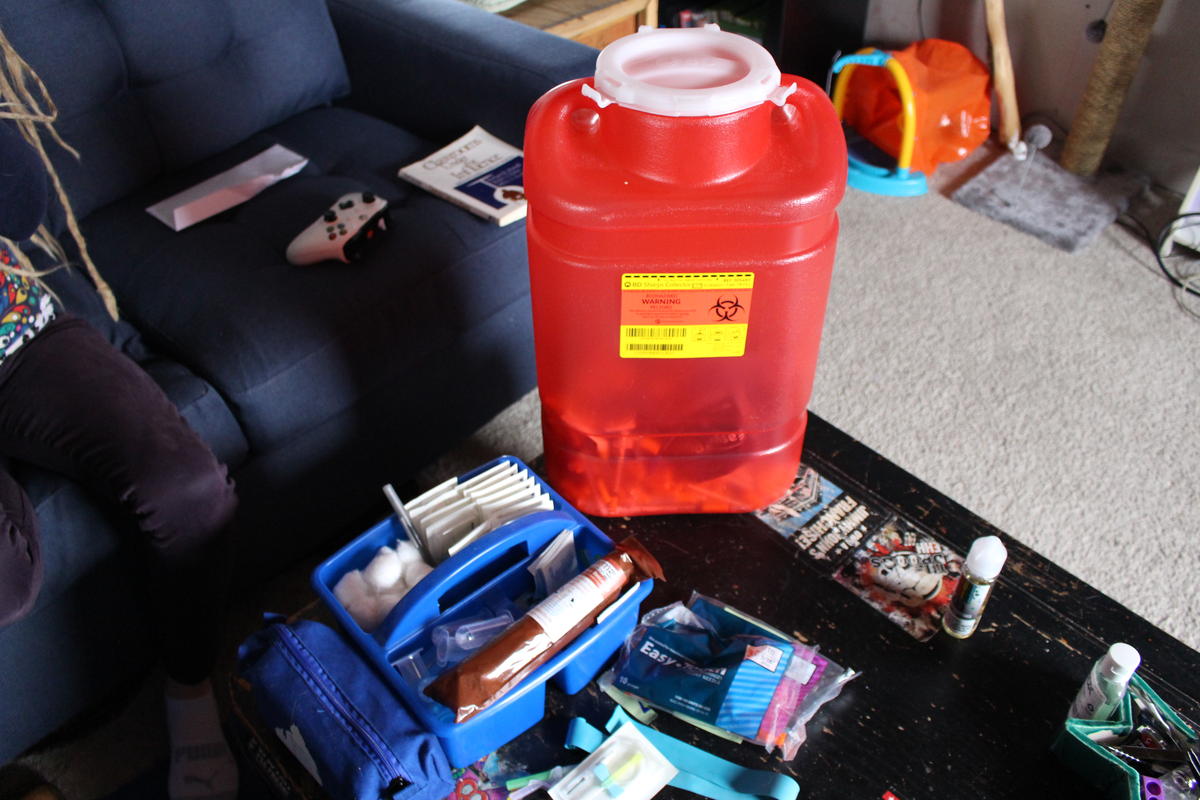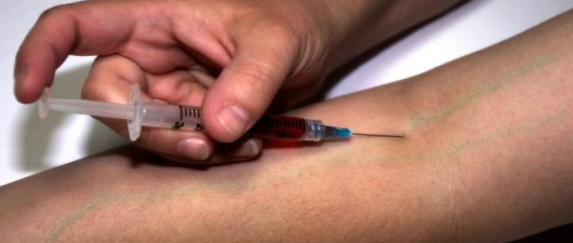Needle exchanges and syringe services could save lives — a topic that divides Michigan lawmakers


Syringe service programs involve giving medical supplies and clean needles to injection drug users.
The Centers for Disease Control and Prevention say people in those programs are three times more likely to stop using drugs than those who aren't in them.
But state and county governments are sometimes ill-equipped or simply don't want to offer them.
Syringe Service Program at home
Angela Boger is a 28-year-old recovering heroin addict in Traverse City. In her living room on an afternoon in November, Boger rifles through a small blue bin. It has four compartments with different medical tools in each one.
"This has my blood draw needles, my butterflies for kits, cotton balls," Angela says, removing them from the bin.
One compartment has an Overdose Rescue Kit with syringes and a few vials of Naloxone.
"These are the vial and syringe ones, so these I give to people that are comfortable already with needles," Boger says.
Injection drug users come to her home a few days each week. Boger will pull this bin from her closet and give them supplies like clean needles or fentanyl test kits.

Boger is also a certified phlebotomist, so she draws blood and tests people for infectious diseases like Hepatitis or HIV. Boger does this work as a volunteer for Harm Reduction Michigan, an addiction outreach agency in Traverse City. They give Boger the supplies and dispose of the dirty needles for her.
"As long as my daughter’s not here, I’m pretty much open all hours of the day and night," she said.
About five years ago, Boger caught Hepatitis C by sharing needles. She kept using drugs after getting treatment for the disease, but found a syringe service program from her counselor.
There she got clean needles and some basic health checkups, which Boger says saved her life.
"If I would have continued using dirty equipment when I had Hepatitis, I could have gotten so much sicker," Boger said.
Eventually when she lost custody of her daughter, Boger turned her life around. She’s been clean for about three years.
Since 2003, deaths caused by Hepatitis C have increased by 57 percent, and injection drug use is one of the biggest risk factors in spreading it.
But Syringe Service Programs can be a tough sell to law enforcement and local governments.

Traverse City's syringe service program
The Grand Traverse County Board of Commissioners considered expanding their program last April. At a meeting, commissioners had to vote on using grant money to increase syringe services in Traverse City.
There’s a federal ban on spending government money on clean needles, but it can be spent on other parts of syringe service programs, like testing for diseases or hiring counselors. The Grand Traverse County Health Department wanted to spend $50,000 in state grant money on just that.
But several county commissioners didn’t see it that way, and questioned the program when it was proposed at the meeting.
"You have $50,000 to not hand out needles?" Commissioner Rob Hentschel asked. "What are we expanding then?"
"This isn't a needle exchange program," Wendy Hirschenberger with the Health Department responded. "It's outreach, it's education from the health department, it's providing vaccinations, it's getting people in to do testing."
Several commissioners said they worried syringe service programs endorse drug use and eventually the contract was voted down.
Organizations like Harm Reduction Michigan still have access to those funds, they just can't spend it themselves and must go through the county health department. Pam Lynch with Harm Reduction Michigan says that makes their work more difficult.
“We could double our staff time with that [money]… and we’re unable to do so because they can’t contract with us,” Lynch said.
Funding is an uphill battle
Zach Ford with AIDS United says syringe service programs aren’t a priority for most local governments, and the federal government spends its money for the opioid epidemic on rehabilitation.
"A lot of their strategy around substance use has been pumping money into treatment services and criminalizing," Ford says.
He says syringe service programs don’t necessarily fit in with that as they don’t aim to funnel people into treatment.
“I think people tend to see the merit in treatment services and not fully understand the syringe services program aspect of it,” Ford said.
Expanding syringe services Up North
There has been some recent movement to expand Syringe Service Programs in northern Michigan. Prosecuting Attorney for Wexford County Jason Elmore says he’s tough on crime and frankly isn’t entirely sold on syringe programs.
"I have that bad taste in my mouth. The idea of giving people needles to help use drugs, am I somehow aiding and abetting their use of controlled substances?" Elmore says.

Last year, 85 police officers and detectives from six different police agences filed over 2,000 police reports in Wexford County. The county's three prosecuting attorneys filed over 400 felony criminal charges, the vast majority of which were drug cases according to Elmore.
He added that the nearby jails and rehab centers are full, so the county has to try something new to get ahead of the opioid epidemic.
"I want to stop people from using, and if maybe — just maybe — a syringe exchange program, as long as it has that rehabilitative element ... I’m in favor of it," Elmore says.
But he says a syringe service program in Wexford County it’s still months away from starting.
The problem of addiction isn't going away
Nearly 3,000 people died last year from drug overdoses in Michigan, according to state data.

The CDC also identified 11 counties in the state that are at a high-risk of an infectious disease outbreak.
All of them are in northern Michigan.
This story was featured on Points North.
 Pathways Drug Rehabilitation Luxury Addiction Treatment & Detox Center
Pathways Drug Rehabilitation Luxury Addiction Treatment & Detox Center


